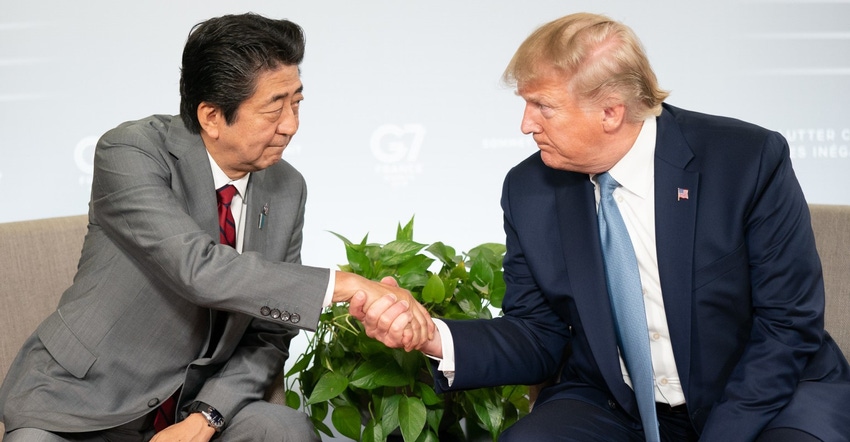U.S.-Japan trade agreement in principle struck
New agreement will open up markets to over $7 billion of the $14 billion in U.S. ag products Japan imports.

A U.S.-Japan trade agreement in principle was announced during a press conference with U.S. President Donald Trump, Japanese Prime Minister Shinzo Abe and U.S. Trade Representative Robert Lighthizer over the weekend on the sidelines of the G7 summit in France. Once implemented it will place the trading relationship with Japan back on a level playing field with international competitors in one of its most important export markets.
On his first day in office, President Trump withdrew from the Trans Pacific Partnership which would have allowed for significant tariff reductions for agricultural market access for the third largest export market for U.S. agricultural products. During the press conference, Lighthizer said Japan imports $14 billion of U.S. agricultural products, and the new agreement will open up markets to over $7 billion of those products.
.@USTradeRep Lighthizer on today's trade announcement: "It has 3 parts—agriculture, industrial tariffs, and digital trade . . . This will open up markets to over 7 BILLION dollars of those products." pic.twitter.com/c0mYKjNViL
— The White House (@WhiteHouse) August 25, 2019
Top U.S. agricultural exports to Japan currently include beef, corn, pork, soybeans and wheat.
In a statement, Secretary of Agriculture Sonny Perdue said by removing existing barriers for U.S. products, the U.S. will be able to sell more to the Japanese markets. “At the same time, we will be able to close gaps to better allow us to compete on a level playing field with our competitors.â€
“I applaud President Trump’s persistence in pursuing a trade agreement in principle with Japan, especially for the U.S. agriculture sector,â€said Senate Agriculture Committee Chairman Pat Roberts (R., Kan.).“U.S. farmers and ranchers currently face a disadvantage in Japan relative to other countries in the Trans-Pacific Partnership, and this agreement will allow our producers to remain competitive as reliable suppliers. I’m optimistic this deal will benefit both the U.S. and Japan, and it will further strengthen this important relationship. I look forward to learning the details of this agreement, and I will continue to engage with the Administration as they finalize the content and language of the deal.â€
In May, an agreement was made between the U.S. and Japan to eliminate restrictions on U.S. beef exports.
“America’s farmers and ranchers are pleased to hear that the U.S. and Japan may be close to a trade deal that includes agriculture. This is much-needed good news on the agricultural trade front,†said Zippy Duvall, president of the American Farm Bureau Federation.
"We have excess corn in various parts of our country with our farmers because China did not do what they said they were going to do. And Prime Minister @AbeShinzo, on behalf of Japan, they're going to be buying all of that corn." — President @realDonaldTrumppic.twitter.com/cqRTDeKZLR
— The White House (@WhiteHouse) August 25, 2019
Although President Trump tweeted that Japan would be purchasing U.S. corn, Abe did not confirm those statements.
U.S. Meat Export Federation (USMEF) President and CEO Dan Halstrom said the announcement is tremendous news for everyone in the red meat supply chain, because it will level the playing field for U.S. pork and beef in the world's most competitive red meat import market. "It is also a very positive development for our customer base in Japan, which USMEF and our industry partners have spent decades building. These customers have been very loyal to U.S. pork and beef, but our exports to Japan could not reach their full potential under Japan's current tariff structure," Halstrom said in a statement.
The National Pork Producers Council welcomed the trade deal as Japan imported 25% of total U.S. pork exports last year. David Herring, a pork producer from Lillington, N.C. and president of NPPC, said, "We look forward to rapid implementation of the agreement as international competitors are currently taking U.S. pork market share through more favorable access," he said.
Dr. Dermot Hayes, an economist at Iowa State University, estimates exports to Japan will grow from $1.6 billion in 2018 to more than $2.2 billion over the next 15 years as a result of the United States pork industry getting market access in Japan as favorable as its competitors.
About the Author(s)
You May Also Like





